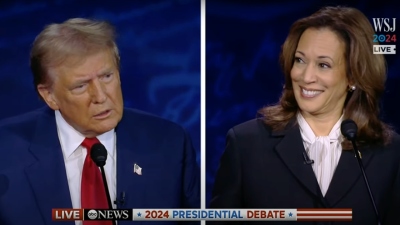Hyper-partisanship, fear of civil discord: Why we need free and fair election more than ever before

Earlier this week, I was in the process of my daily ritual of reading the four newspapers I read every weekday morning (The Wall Street Journal, The New York Times, USA Today, and the Nashville Tennessean).
This particular day two articles caught my attention as being especially newsworthy at this precise moment in our nation’s history. As we are experiencing an excruciatingly close and unpredictable national election, these articles illustrated that the tightness of the national election are an accurate reflection of the even divide in our national electorate.
The first article in USA Today, "Red states are redder. Blue states are bluer. And our politics? Hotter," by Susan Page, Suhail Bhat, Savannah Kuchar and Sudiksha Kochi, is part of a multi-part series on the population shifts taking place in the United States and the impact it is having on our national life. America has undergone a significant “sorting” of its population “since 2012 that has intensified the partisan leanings in states across the country, leaving only a handful where the outcome of the Nov. 5 presidential election remains in doubt.”
As a consequence, 40 of the 50 states now have one-party control (governor and state legislature) in their respective states. This one-party control (17 under Democrats and 23 Republicans) in these states has led to more conservative government in red states and more liberal government in blue states.
At the county level, “Seventy-three percent of counties became more partisan from 2012 to 2020, including 224 blue counties that got bluer and 2050 red counties that got redder.” Only 19% of counties became less partisan and only 8% of counties “changed colors.”
This geographic resorting into hyper-partisan political expression has resulted in 33 of the 50 states having “voted for the same party in every presidential election…from 2000 to 2020.” Conversely, from 1960 to 1980, “not a single state voted for the same party in every presidential election.”
One great consequence of this partisan self-sorting is that both major party presidential candidates have been, and will be, focusing on just seven “battleground” states where the presidential election results are “up for grabs”—Arizona, Georgia, Michigan, Nevada, North Carolina, Pennsylvania, and Wisconsin.
America’s hyper-partisan resorting is also reflected in the U.S. Congress. In the House of Representatives, there is now virtually no overlap between Republican and Democrat congressmen (the most conservative Democrat has a more liberal voting record than the most liberal Republican). This hyper-partisanship makes it increasingly difficult to forge political compromise in the House or the Senate.
Many of us have experienced this hyper-sorting in the communities and regions where we live. I live in Williamson County (suburban Nashville) in Tennessee that voted 62% to 36% for Donald Trump over Joe Biden in the 2020 presidential election. This area is experiencing rapid population growth with significant numbers of Californians fueling much of it. Colleagues in both the Dallas-Ft. Worth and Houston areas have experienced similar influxes of Californians most of whom identify as “red” in their political views.
Given current trends, the hyper-partisan self-sorting is making bipartisan cooperation even more difficult. It has often been observed that politics is downstream from culture and culture is downstream from religion. Many of the issues that currently divide us illustrate this truth, from abortion to transgender surgeries, and everywhere in between.
Even as we disagree, we need to strive to maintain civility and a commitment to live with the election results until the next election. An article in The Wall Street Journal illustrates what happens when we do not agree to disagree without being disagreeable. Jim Carlton, in his article, “From Bocce to Brawls: How Politics Tore Apart a California Retirement Community,” relates how partisan disagreements have sown discord at Rossmoor, a California hillside retirement community described as a “boomer paradise” of approximately 10,000 affluent boomer retirees.
Competing editorials in the community’s newspaper, the Rossmoor News, are keeping emotions at a high pitch this election season. Finally, in the wake of the attempt to assassinate former President Trump last July, violence broke out, and of all things, the pickleball court. Eye witnesses reported “kicking, hitting and hair pulling.”
As these altercations continued, Roosmoor’s administrators “suspended the Roosmoor News’ political columns, pending new policy discussion.”
People have been warning Americans that in the wake of this election, they fear there will be civil discord no matter who prevails in the election. What is at stake here is the rule of law, a very precious thing. The rule of law depends on the people accepting the outcome of the election even if their side loses.
One thing that helps the rule of law prevail is to make it manifestly clear that the elections are fair. We should do everything we can to make sure the elections are fair and just and are seen to be so. Then, in the election’s aftermath, we accept the result. And if we lose, we pledge to try to make a more convincing argument in the next election.
Let us all pray that God will grant us a fair and just election and that we all will accept the results, no matter the outcome.
Dr. Richard Land, BA (Princeton, magna cum laude); D.Phil. (Oxford); Th.M (New Orleans Seminary). Dr. Land served as President of Southern Evangelical Seminary from July 2013 until July 2021. Upon his retirement, he was honored as President Emeritus and he continues to serve as an Adjunct Professor of Theology & Ethics. Dr. Land previously served as President of the Southern Baptist Convention's Ethics & Religious Liberty Commission (1988-2013) where he was also honored as President Emeritus upon his retirement. Dr. Land has also served as an Executive Editor and columnist for The Christian Post since 2011.
Dr. Land explores many timely and critical topics in his daily radio feature, “Bringing Every Thought Captive,” and in his weekly column for CP.





















